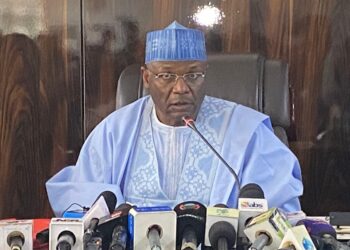The recent warning by Nigeria’s electoral umpire, the Independent National Electoral Commission (INEC), to political parties and their prospective candidates against early campaigns ahead of the 2027 general elections is apt and timely.
Although early campaign by Nigeria’s politicians is not a new phenomenon, the trend intensified in the current political dispensation with the activities of the African Democratic Congress (ADC) coalition, which seeks to unseat the incumbent President Bola Ahmed Tinubu from power in the 2027 presidential election.
Apparently, irked by the early electioneering, with its attendant consequences on governance, the INEC said that such actions were not only inappropriate but also go against the grain of the Electoral Act 2022.
Sounding a note of caution through the Chief Press Secretary to the INEC chairman, Rotimi Oyekanmi, the election management body said it had yet to release the timetable and schedule of activities for the 2027 general elections.
“To that extent, party primaries have not been held, and no political party has nominated candidates for the next general election”, he said.
Oyekanmi noted that while Nigerians have the right and liberty to engage in political discussions and express their views on the next general elections, any open campaign or canvassing votes for the 2027 general elections is not only inappropriate but also a violation of the Electoral Act.
Specifically, Section 94(1) of the Electoral Act 2022 stipulates that the period of campaigning in public by political parties for an election shall commence 150 days before polling day and end 24 hours prior to that day.
Section 95 (1) of the Act also states that a candidate and his or her party shall campaign for an election in accordance with such rules and regulations as may be determined by INEC.
“The attention of all political parties in Nigeria was drawn to this situation at our last quarterly consultative meeting, and the commission expects full compliance with the law”, Oyekanmi said.
The warning is coming as major players, including Labour Party (LP) presidential candidate in the 2023 general elections, governors on the All Progressives Congress (APC) platforms as well as their backers and supporters strategise ahead of the 2027 poll.
While early preparations, such as political consultations, alignments, realignments and permutations, by political parties and their prospective candidates for elective offices are within the ambit of the law, using them as a shield for electioneering is not only deplorable but also an outright violation of the Electoral Act.
These illegalities and their disruptive tendencies of governance may have informed the wisdom of the drafters of the Electoral Act to specify the period and timetable for every activity related to elections across all elective offices in the country, namely, the presidential, national assembly, governors and state houses of assembly, among other elections.
But in their desperation to either capture power, in the case of the opposition, or retain it, in the case of the ruling party, Nigeria’s politicians and their parties go overboard to contravene the nation’s laws by embarking on early campaigns in the guise of restrategising or realigning towards the next election. This act of lawlessness is not just detrimental to good governance; it is antithetical to the evolution of the nation’s democracy.
The primary purpose of government, as enshrined in Section 14(2)(b) of the Constitution of the Federal Republic of Nigeria 1999 (as amended) is the security and welfare of the people. This implies that the government’s actions and policies should be primarily focused on ensuring the safety and well-being of its citizens. Additionally, the constitution emphasises that sovereignty belongs to the people and that they should participate in their government.
Without a doubt, this onerous provision of the constitution is defeated by the early campaign phenomenon, especially of the type and nature currently being undertaken by the ADC coalition which tends to promote hate speech, character assassination and propaganda that incite the citizens against their government.
The federal government recently had cause to debunk media reports to the effect that President Tinubu is distracted by the emergence of the opposition ADC coalition. Refuting the report, the Minister of Information and National Orientation, Mohammed Idris, said the Tinubu administration remains firmly committed to its core mandate of delivering meaningful reforms and real economic growth for Nigerians.
In an apparent response to the alleged attempt by the government to muffle and mangle the opposition, Idris affirmed the right of all Nigerians to freely exercise their constitutionally guaranteed freedoms of association and of speech, but added that Tinubu will not be sidetracked by politicking or political distractions.
Much as Blueprint commends INEC for its timely and proactive warning against early campaigns by political parties and their prospective candidates, it is expedient to urge the electoral umpire to wield the big stick. The INEC must go beyond mere warnings to enforce the provisions of the Electoral Act on its violators in order to serve as a deterrence to further breaches.
On its part, political parties and their prospective candidates should strive to avoid a situation where they are regarded as renegades, who have contempt for the rule of law. This undesirable situation could undermine and botch their aspiration for elective offices. They should be collaborators in the task of nation-building rather than being a cog in the wheel of progress.
